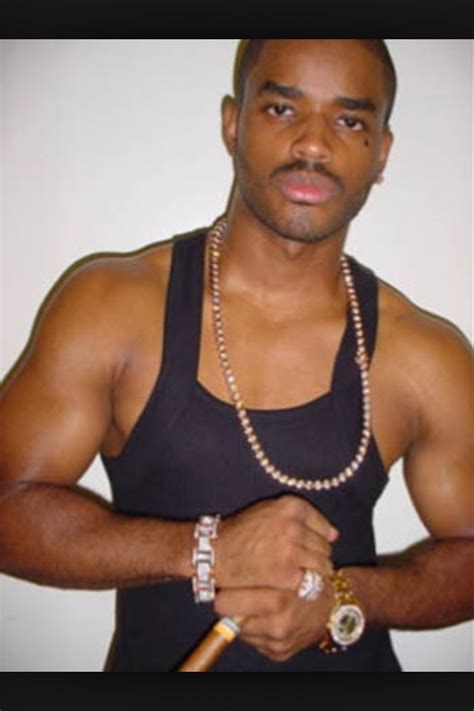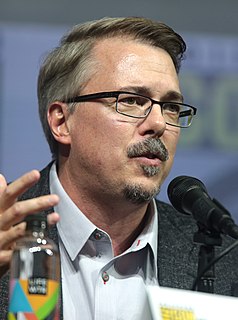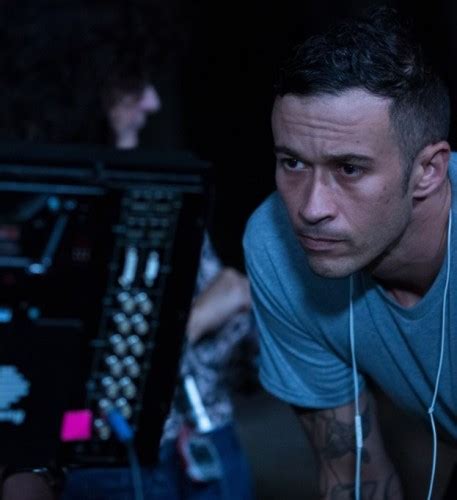A Quote by Callie Khouri
It's a tough time for screenwriters right now, because fewer movies are getting made. I'm enjoying television so much. It offers opportunities for writers to be in a writers' room and work their way up. It's somewhat easier because there's more of a community. There are so many screenwriters with incredible stories to tell, so I hope there will be some kind of shift in the business where very few types of movies are now made by the studios. There needs to be different budgets for different audiences; not everything having to be a huge opening weekend.
Quote Topics
Audiences
Be Different
Because
Budgets
Business
Community
Different
Easier
Enjoying
Everything
Few
Fewer
Getting
Having
Hope
Huge
Incredible
Kind
Made
Many
More
Movies
Much
Needs
Now
Offers
Opening
Opportunities
Right
Right Now
Room
Screenwriters
Shift
Some
Somewhat
Stories
Studios
Television
Tell
Time
Tough
Types
Up
Very
Way
Weekend
Will
Work
Writers
Related Quotes
The creative process is a very collaborative process. I know it might seem that way because so much ink is spilled and the media is obsessed with business and numbers and studios... but filmmakers don't think of it that way. We just go off and we tell our stories. It's the same torture that we adore, it's the same torture that our forefathers endured making movies in the golden era of Hollywood. So, from my perspective it's no different, I'm sure, from the men and women who I admire so much who made the earliest movies.
You can point to a lot of women showrunners that have had long and successful careers. In terms of the kinds of movies that women can get made, as long as the business operates under this model of the first-weekend [box office] focus, with huge movies aimed at super-young audiences, it will be really tough for women to do something that really changes the landscape. Because honestly, until they figure out how to get grown women into the theaters on the first weekend, it won't change.
The bigger problem still is that it determines in many ways what movies get made in the first place. Because as sources of finance are considering a project, they ask themselves, "Does this lend itself to a simplistic marketing approach which will guarantee a big opening weekend?" As a movie-goer, I think that's tragic, because when you look back at those movies that made us fall in love with movies in the first place, most of them were not high-concept, and most of them would not have "won their weekend."
I think that television lately has been extremely dark and, in some ways, cynical but I also think that people who are writing those shows probably feel exactly as I do - that sometimes the darkness of a story can highlight the light in a story. There's a lot of cynical stuff but I think it may be even more in movies now where you see so many movies about cynical and corrupted characters. That's the state of many movies right now but movies, television, all of culture, there's always going to be a battle between the stories that are cynical and stories that are hopeful.
The industry has changed in big ways. When I started making movies, the studios were not all owned by huge conglomerates, so the decisions were made in a very different way. Over the years, I've watched both the rise and the decimation and fall of the DVD as a portion of where you could generate revenue from making this kind of content. We've seen this change in the balance sheet on the international side of the ledger; it's now a much bigger percentage than it is on domestic, even though movies would have been previously really domestically driven.
I made a body of work, which was like trying to make movies on a wall and was made up of all different images and materials. I had the aspiration to make movies because I thought that was the cycle. I had this insane egomaniac idea that I could make movies because I made these gigantic art projects.
In the '60s and '70s it was a great period for American films because studios were still run by individuals who worked off the seat of their pants and went along with things. At that time, they were very uncertain about what to make because of the influence of television. A lot of really terrific movies were made. But then the studios gradually became more corporate and were owned by corporations and run in that way and now they're very nervous. You see what they make - sequels, franchises and try not to take risks.
I make the joke, all the time, that if you have the word "man" and a number in the title, like Batman 2, Spider-Man 2 or Iron Man 12, you'll get it made. The kind of movies I make, studios don't make them. I've made a lot of movies, and at Castle Rock, we've made 125 movies. None of them get made at a studio. I've got to scrounge around for money, every time. I just like to tell stories. I'm a storyteller, so I want the most people to see it.
The model we established was to give creative people complete creative freedom in exchange for betting on themselves, so they work for the minimums you're allowed to work for, and if the movies work in a big way, everyone does very well. If the movies don't, nobody loses too much money. The benefit to doing all the movies low budget is we can tell different types of stories and take creative risks. The Purge would have been irresponsible to do for $20M, but to do it for $3M makes sense.
Television is a great job for a writer in the way that movies used to be, way before my time. Back when writers in Hollywood were on staff or under contract at any given studio and you'd write movie scripts and then the movies would get made within a few weeks, such that you could be a working writer in the movie business back in the '30s and '40s and '50s and have a hand in writing five or six movies a year that actually got produced. The only thing remotely like that in the 21st century here in Hollywood is working in the TV business.
Comic books themselves are getting more literate. And there are people who are screenwriters and television writers and novelists who are writing for the comics, for some reason, they love doing it and some of the art work in the comics, I mean it rivals anything you'll see hanging on the walls of museums, they're illustrations more than drawings and all the people are discovering this and they're turning on to it.
Part of why I wanted to produce was because I wanted the opportunity to work on projects I want to see. As a writer and as a director, I'm very specific about the kinds of things that I want to do. The opportunity that producing has given me is that by working with different writers and trying to get their movies made, or developing their script, or making their movies, every time I'm doing it, I'm learning and then bringing something to my own work. I like to think that there's a little bit of back and forth that goes on.




































